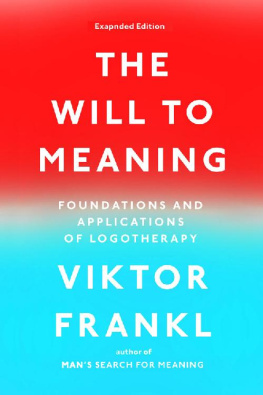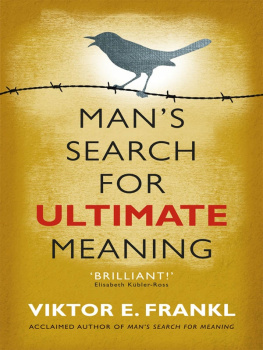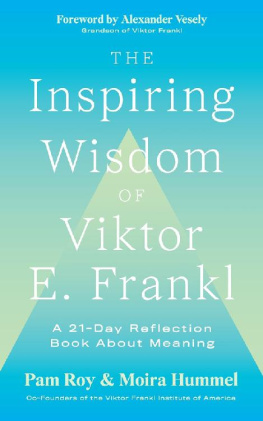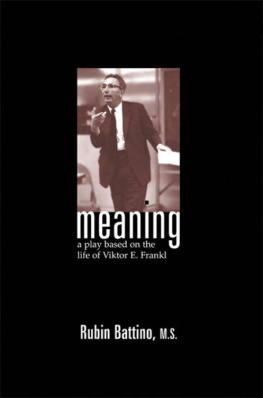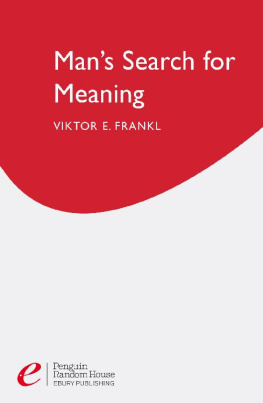Viktor E. Frankl - The Will to Meaning
Here you can read online Viktor E. Frankl - The Will to Meaning full text of the book (entire story) in english for free. Download pdf and epub, get meaning, cover and reviews about this ebook. year: 2014, publisher: Penguin Publishing Group, genre: Science. Description of the work, (preface) as well as reviews are available. Best literature library LitArk.com created for fans of good reading and offers a wide selection of genres:
Romance novel
Science fiction
Adventure
Detective
Science
History
Home and family
Prose
Art
Politics
Computer
Non-fiction
Religion
Business
Children
Humor
Choose a favorite category and find really read worthwhile books. Enjoy immersion in the world of imagination, feel the emotions of the characters or learn something new for yourself, make an fascinating discovery.
- Book:The Will to Meaning
- Author:
- Publisher:Penguin Publishing Group
- Genre:
- Year:2014
- Rating:5 / 5
- Favourites:Add to favourites
- Your mark:
- 100
- 1
- 2
- 3
- 4
- 5
The Will to Meaning: summary, description and annotation
We offer to read an annotation, description, summary or preface (depends on what the author of the book "The Will to Meaning" wrote himself). If you haven't found the necessary information about the book — write in the comments, we will try to find it.
The Will to Meaning — read online for free the complete book (whole text) full work
Below is the text of the book, divided by pages. System saving the place of the last page read, allows you to conveniently read the book "The Will to Meaning" online for free, without having to search again every time where you left off. Put a bookmark, and you can go to the page where you finished reading at any time.
Font size:
Interval:
Bookmark:
A PLUME BOOK
VIKTOR E. FRANKL was professor of neurology and psychiatry at the University of Vienna Medical School. For twenty-five years he was head of the Vienna Neurological Policlinic. His Logotherapy/Existential Analysis came to be known as the Third Viennese School of Psychotherapy. He held professorships at Harvard, Stanford, Dallas, and Pittsburgh, and was Distinguished Professor of Logotherapy at the U.S. International University in San Diego, California.
Born in 1905, Frankl received the degrees of Doctor of Medicine and Doctor of Philosophy from the University of Vienna. During World War II he spent three years at Auschwitz, Dachau, and other concentration camps.
Throughout four decades Dr. Frankl made innumerable lecture tours throughout the world. He received honorary degrees from twenty-nine universities in Europe, the Americas, Africa, and Asia. He held numerous awards, among them the Oskar Pfister Award of the American Psychiatric Association and an Honorary Membership of the Austrian Academy of Sciences.
Frankls thirty-nine books appeared in forty languages. His book Mans Search for Meaning has sold millions of copies and has been listed among the ten most influential books in America according to a survey conducted by the Book of the Month Club and the Library of Congress.
He died in Vienna in 1997.
WILL TO
MEANING
FOUNDATIONS
AND APPLICATIONS
OF LOGOTHERAPY
Expanded Edition
VIKTOR E. FRANKL

PLUME
Published by the Penguin Group
Penguin Group (USA) LLC
375 Hudson Street
New York, New York 10014

USA | Canada | UK | Ireland | Australia
New Zealand | India | South Africa | China
penguin.com
A Penguin Random House Company
First published in the United States of America by World Publishing Co. 1969
First Plume printing 1970
First Meridian printing (expanded edition) 1988
First Plume printing (expanded edition) 2014
Copyright 1969, 1988 by Viktor E. Frankl
Penguin supports copyright. Copyright fuels creativity, encourages diverse voices, promotes free speech, and creates a vibrant culture. Thank you for buying an authorized edition of this book and for complying with copyright laws by not reproducing, scanning, or distributing any part of it in any form without permission. You are supporting writers and allowing Penguin to continue to publish books for every reader.
Figures 1, 2, 3, 4, and 7 from The Task of Education in an Age of Meaninglessness, by Viktor E. Frankl, in Sidney S. Letter, ed., New Prospects for the Small Liberal Arts College (New York: Teachers College Press, 1968), used by permission of Teachers College Press.
 REGISTERED TRADEMARKMARCA REGISTRADA
REGISTERED TRADEMARKMARCA REGISTRADA
LIBRARY OF CONGRESS CATALOGING-IN-PUBLICATION DATA
Frankl, Viktor Emil.
The will to meaning.
Includes index.
ISBN: 978-1-101-66402-5
1. Logotherapy. I. Title.
RC489.L6F698 1988 616.8916 88-12529
Version_2
In memorium
Gordon W. Allport
T his book is the outcome of a series of lectures I was invited to give during the 1966 summer session of Perkins School of Theology at Southern Methodist University in Dallas, Texas. The particular task assigned to me at that time was to explain the system that characterizes logotherapy. While it has often been pointed out by various authors that logotherapy, in contrast to the other schools of existential psychiatry, has developed a proper psychotherapeutic technique, it has scarcely been noticed that it also is the last psychotherapy that is conceptualized in a systematic way.
Dealing with the foundations of the system, the chapters of this book set forth the basic assumptions and tenets underlying logotherapy. They form a chain of links interconnected with one another, in that logotherapy is based on the following three concepts: (1) the freedom of will; (2) the will to meaning; and (3) the meaning of life. (1) The freedom of will involves the issue of determinism versus pan-determinism. (2) The will to meaning is discussed as distinct from the concepts of the will to power and the will to pleasure as they are presented by Adlerian and Freudian psychology, respectively. To be sure, the term, will to power, was coined by Nietzsche rather than Adler, and the term, will to pleasurestanding for Freuds pleasure principleis my own and not Freuds. Moreover, the pleasure principle should be seen in the light of a broader concept, the homeostasis principle. While criticizing both concepts, we shall have to elaborate on logotherapys motivational theory. (3) The meaning of life relates to the issue of relativism versus subjectivism.
The applications of logotherapy discussed in this book are also threefold. First of all, logotherapy is applicable as a treatment of noogenic neuroses; second, logotherapy is a treatment of psychogenic neuroses, i.e., neuroses in the conventional sense of the word; and third, logotherapy is a treatment of somatogenic neuroses or, for that matter, somatogenic diseases in general. As we see, all the dimensions of a human being are reflected in this sequence of subject matters.
In the introductory chapter of this book, logotherapy is placed in perspective with other schools of psychotherapy, and, specifically, with existentialism in the field of psychotherapy. The last chapter deals with the dialogue between logotherapy and theology.
I have tried in this book to include the latest development of logotherapy with respect to both the formulation of the individual tenets and the material serving as an illustration. However, the attempt to offer a rounded picture of the whole system compels me to include some material which has been used in my previous books.
What I term the existential vacuum constitutes a challenge to psychiatry today. Ever more patients complain of a feeling of emptiness and meaninglessness, which seems to me to derive from two facts. Unlike an animal, man is not told by instincts what he must do. And unlike man in former times, he is no longer told by traditions what he should do. Often he does not even know what he basically wishes to do. Instead, either he wishes to do what other people do (conformism), or he does what other people wish him to do (totalitarianism).
I hope that I shall be successful in conveying to the reader my conviction that, despite the crumbling of traditions, life holds a meaning for each and every individual, and even more, it retains this meaning literally to his last breath. And the psychiatrist can show his patient that life never ceases to have a meaning. To be sure, he cannot show his patient what the meaning is, but he may well show him that there is a meaning, and that life retains it: that it remains meaningful, under any conditions. As logotherapy teaches, even the tragic and negative aspects of life, such as unavoidable suffering, can be turned into a human achievement by the attitude which a man adopts toward his predicament. In contrast to most of the existentialist schools of thought, logotherapy is in no way pessimistic; but it is realistic in that it faces the tragic triad of human existence: pain, death, and guilt. Logotherapy may justly be called optimistic, because it shows the patient how to transform despair into triumph.
In an age such as ours, in which traditions are on the wane, psychiatry must see its principal assignment in equipping man with the ability to find meaning. In an age in which the Ten Commandments seem to many people to have lost their unconditional validity, man must learn to listen to the ten thousand commandments implied in the ten thousand situations of which his life consists. In this respect I hope the reader will find that logotherapy speaks to the needs of the hour.
Font size:
Interval:
Bookmark:
Similar books «The Will to Meaning»
Look at similar books to The Will to Meaning. We have selected literature similar in name and meaning in the hope of providing readers with more options to find new, interesting, not yet read works.
Discussion, reviews of the book The Will to Meaning and just readers' own opinions. Leave your comments, write what you think about the work, its meaning or the main characters. Specify what exactly you liked and what you didn't like, and why you think so.

